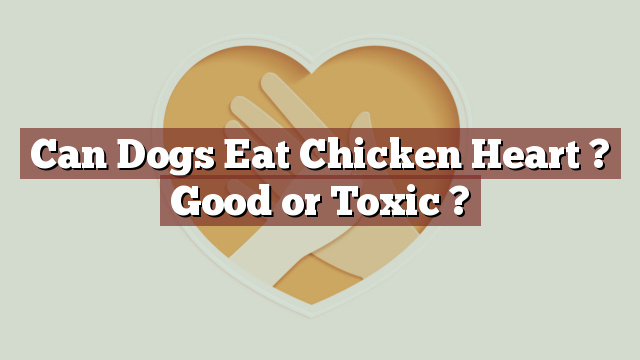Can Dogs Eat Chicken Heart? Good or Toxic?
Knowing what foods are safe for our pets to consume is of utmost importance for their overall health and well-being. One common question that arises is whether dogs can safely eat chicken heart. In this article, we will explore the nutritional value of chicken heart, examine expert opinions and studies on its safety, weigh the potential risks and benefits, provide steps to take if your dog consumes chicken heart, and conclude with the importance of moderation and consultation.
Nutritional Value of Chicken Heart: Rich in Vitamins and Minerals
Chicken heart is a highly nutritious organ meat that offers a range of vitamins and minerals beneficial for both dogs and humans. It is a rich source of protein, iron, zinc, and various B vitamins such as B12, riboflavin, and niacin. These nutrients play essential roles in maintaining muscle function, promoting red blood cell production, and supporting a healthy immune system. Additionally, chicken heart contains a significant amount of taurine, an amino acid vital for cardiovascular health in dogs.
Is Chicken Heart Safe for Dogs? Expert Opinion and Studies
Yes, dogs can safely eat chicken heart. According to veterinarians and scientific research, chicken heart is regarded as a healthy and safe addition to a dog’s diet. It is important to note that the chicken heart should be properly cooked, devoid of any seasoning, and served in moderation. Raw chicken heart may pose a risk of bacterial contamination, so cooking it thoroughly is essential to ensure the elimination of potential pathogens.
Potential Risks or Benefits: Weighing the Pros and Cons
When considering the potential risks and benefits of feeding chicken heart to dogs, it is crucial to evaluate individual factors such as the dog’s overall health, existing dietary restrictions, and portion control. While chicken heart offers numerous health benefits, such as supporting muscle growth and providing essential nutrients, overconsumption may lead to an imbalance in the dog’s diet or contribute to weight gain. It is always advisable to consult with a veterinarian to determine the appropriate amount of chicken heart to include in your dog’s diet.
What to Do If Your Dog Eats Chicken Heart: Steps to Take
If your dog consumes chicken heart, there is typically no need for immediate concern. However, it is essential to monitor your dog for any signs of gastrointestinal upset, such as vomiting or diarrhea. If these symptoms persist or worsen, it is recommended to consult a veterinarian for further guidance. Additionally, if your dog has any pre-existing health conditions or allergies, it is best to consult with a veterinarian before introducing any new foods into their diet.
Conclusion: Moderation and Consultation Are Key
In conclusion, dogs can safely eat chicken heart, as it is a nutritious and beneficial addition to their diet. However, it is crucial to exercise moderation and ensure proper cooking to eliminate potential health risks. Prioritizing a balanced diet and consulting with a veterinarian regarding your dog’s specific dietary needs is vital. By following these guidelines, you can provide your furry companion with a healthy and enjoyable diet that includes the occasional treat of chicken heart.
Thank you for investing your time in exploring [page_title] on Can-Eat.org. Our goal is to provide readers like you with thorough and reliable information about various dietary topics. Each article, including [page_title], stems from diligent research and a passion for understanding the nuances of our food choices. We believe that knowledge is a vital step towards making informed and healthy decisions. However, while "[page_title]" sheds light on its specific topic, it's crucial to remember that everyone's body reacts differently to foods and dietary changes. What might be beneficial for one person could have different effects on another. Before you consider integrating suggestions or insights from "[page_title]" into your diet, it's always wise to consult with a nutritionist or healthcare professional. Their specialized knowledge ensures that you're making choices best suited to your individual health needs. As you navigate [page_title], be mindful of potential allergies, intolerances, or unique dietary requirements you may have. No singular article can capture the vast diversity of human health, and individualized guidance is invaluable. The content provided in [page_title] serves as a general guide. It is not, by any means, a substitute for personalized medical or nutritional advice. Your health should always be the top priority, and professional guidance is the best path forward. In your journey towards a balanced and nutritious lifestyle, we hope that [page_title] serves as a helpful stepping stone. Remember, informed decisions lead to healthier outcomes. Thank you for trusting Can-Eat.org. Continue exploring, learning, and prioritizing your health. Cheers to a well-informed and healthier future!

